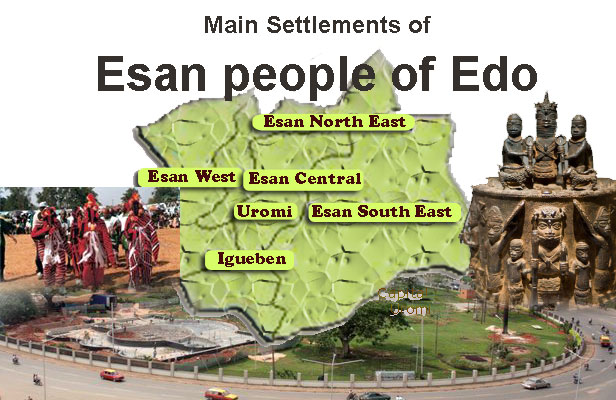Esan People, “Who we are”
ORIGIN OF THE NAME ESAN
It is believed by many historians that the name “Esan” (originally, E san fia) owes its origin to Bini (meaning, “they have fled” or “they jumped away”). Ishan is an anglicized form of Esan, the result of the colonial's inability to pronounce the name of this ethnic group. The Esan speaking Edo people of Nigeria (Ebho Esan) occupies the Southern part of Nigeria. The people of Esan have a common language, (with mild variances); customs and traditions. The population of Esan people who currently reside within Esan land is estimated to be between 1.0 and 2.5 million.
The ancestral origin of Esan people is traceable to the Bini (Edo) people of the powerful pre-colonial African kingdom of Benin in Nigeria. The evolution of modern Esan nation is believed to have started in the 15th century, when citizens, mostly nobles and princes, left the neighboring, main capital city of the Benin Empire for the northeast, as extensions of the Benin empire. There, they formed communities and kingdoms called Eguares, possibly amongst the aboriginal people that they met there. Esan land was colonized along with the rest of the Benin Empire by the British in the late 1800. Ancient Esan people were militaristic, highly homogenous, vibrant, agro-fishery and Edoid-speaking people. They were traditionally farmers, herbalists, warriors, and hunters-gatherers. Modern Esan people are said to be positive in outlook, creative, industrious, and well learned. They are one of Nigeria’s most influential minority ethnic group and live primarily in the Edo central senatorial District of Nigeria.
Esan people primarily speak èsán, an Edoid language related to Edo, Urhobo, Owan, Isoko, and Etsako languages. It is considered a regionally important language in Nigeria, and it is taught in primary schools in addition to being broadcast on radio and television. The Esan language is also recognized in the census of the United Kingdom.
It is believed by many historians that the name “Esan” (originally, E san fia) owes its origin to Bini (meaning, “they have fled” or “they jumped away”). Ishan is an anglicized form of Esan, the result of the colonial's inability to pronounce the name of this ethnic group. The Esan speaking Edo people of Nigeria (Ebho Esan) occupies the Southern part of Nigeria. The people of Esan have a common language, (with mild variances); customs and traditions. The population of Esan people who currently reside within Esan land is estimated to be between 1.0 and 2.5 million.
The ancestral origin of Esan people is traceable to the Bini (Edo) people of the powerful pre-colonial African kingdom of Benin in Nigeria. The evolution of modern Esan nation is believed to have started in the 15th century, when citizens, mostly nobles and princes, left the neighboring, main capital city of the Benin Empire for the northeast, as extensions of the Benin empire. There, they formed communities and kingdoms called Eguares, possibly amongst the aboriginal people that they met there. Esan land was colonized along with the rest of the Benin Empire by the British in the late 1800. Ancient Esan people were militaristic, highly homogenous, vibrant, agro-fishery and Edoid-speaking people. They were traditionally farmers, herbalists, warriors, and hunters-gatherers. Modern Esan people are said to be positive in outlook, creative, industrious, and well learned. They are one of Nigeria’s most influential minority ethnic group and live primarily in the Edo central senatorial District of Nigeria.
Esan people primarily speak èsán, an Edoid language related to Edo, Urhobo, Owan, Isoko, and Etsako languages. It is considered a regionally important language in Nigeria, and it is taught in primary schools in addition to being broadcast on radio and television. The Esan language is also recognized in the census of the United Kingdom.
